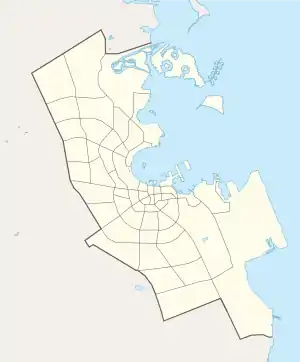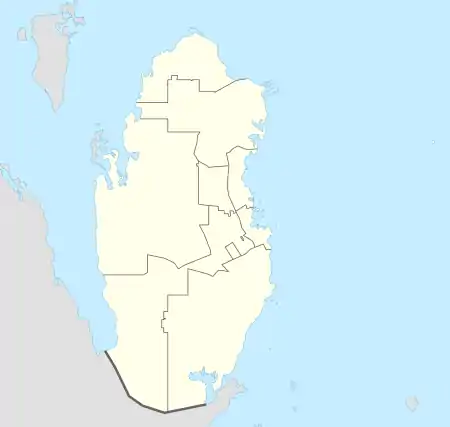Rumeilah (Doha)
Rumeilah (Arabic: اَلرُّمَيْلَة, romanized: Ar Rumaylah; also spelled Rumaila) is a neighborhood of Doha, Qatar. It is divided into an eastern and western section.[1] Zone 11, the eastern section, hosts roughly half of Al Bidda Park while Zone 21 contains most of Hamad Medical Corporation's facilities. Hamad Medical City was constructed over a 227,000 square meter area in Rumeilah at a cost of $659 million.[2] Portions of Hamad Medical City form its own district to the west.[3]
Rumeilah
اَلرُّمَيْلَة | |
|---|---|
District | |
.jpg.webp) Aerial view of Rumeilah | |
 Rumeilah  Rumeilah | |
| Coordinates: 25°17′N 51°32′E | |
| Country | |
| Municipality | Ad-Dawhah |
| Zone | Zone 11, Zone 21 |
| District no. | 11 |
| Area | |
| • Total | 1.7 km2 (0.7 sq mi) |
| Population (2010) | |
| • Total | 1,595 |
| • Density | 940/km2 (2,400/sq mi) |
Etymology
Rumeilah derives its name from the Arabic word "raml", which translates to "sand". It earned this name due its sandy soils.[3]
Landmarks
- HMC Heart Hospital.[4]
- HMC Rumeilah Hospital.[4]
- HMC Al Amal Hospital on Al Istiqlal Street.[4]
- HMC Dental and Oral Surgery Centre on Al Razi Street.[4]
- Hamad International Medical Training Center.[4]
- HMC Institute of Nursing.[4]
- Ministry of Public Health on Al Istiqlal Street.[4]
Al Bidda Park
Al Bidda Park (formerly known as Rumaila Park) is partially located in Rumeilah and is split into two parts by Rumeilah Street, with the eastern side being in Al Bidda.[3]
Transport
Mowasalat is the official transport company in Qatar and serves the community through its operation of public bus routes. Rumeilah is served by two bus lines, both of which depart from Al Ghanim Bus Station.[5] Route 56 has stops at Rumeilah Hospital and Madinat Khalifa South and a terminus at New Al Gharrafa, running at frequency of every 30 minutes on all days of the week. Route 156 has also has stops at Rumeilah Hospital and Madinat Khalifa South but has a terminus at Al Kharaitiyat Bus Station, and likewise runs at a frequency of every 30 minutes on all days of the week.[5][6]
Major roads that run through the district are Al Rumeila Street, Mohammed Bin Thani Street, Onaiza Street, Al Bidda Street, Al Rayyan Road, Ahmed Bin Ali Street, and Corniche Street.[7]
Demographics
As of the 2010 census, the district comprised 856 housing units[8] and 58 establishments.[9] There were 1,595 people living in the district, of which 28% were male and 72% were female. Out of the 679 inhabitants, 90% were 20 years of age or older and 10% were under the age of 20. The literacy rate stood at 99%.[10]
Employed persons made up 84% of the total population. Females accounted for 74% of the working population, while males accounted for 26% of the working population.[10]
| Year | Population |
|---|---|
| 1986[11] | 5,866 |
| 1997[12] | 4,319 |
| 2004[1] | 4,056 |
| 2010[13] | 1,595 |
References
- "2004 population census". Qatar Statistics Authority. Retrieved 1 July 2015.
- Kim Kemp (4 May 2016). "Qatar: Seven hospitals given new opening dates". Construction Week Online. Retrieved 18 July 2018.
- "District map". The Centre for Geographic Information Systems of Qatar. Retrieved 31 December 2018.
- "Qatar Landmarks". Ministry of Development Planning and Statistics. Retrieved 12 January 2019.
- "Route Maps". Qatar Transit Guide. Retrieved 21 January 2019.
- "Qatar Public Transport Program (QPTP)". Ministry of Transport and Communications. Retrieved 21 January 2019.
- "Index map of Qatar". ArcGIS.com. Retrieved 25 August 2019.
- "Housing units, by type of unit and zone (April 2010)" (PDF). Qatar Statistics Authority. Retrieved 7 August 2015.
- "Establishments by status of establishment and zone (April 2010)" (PDF). Qatar Statistics Authority. Retrieved 7 August 2015.
- "Geo Statistics Application". Ministry of Development Planning and Statistics. Archived from the original on 11 September 2012. Retrieved 7 August 2015.
- "1986 population census" (PDF). Qatar Statistics Authority. Archived from the original (PDF) on 3 July 2015. Retrieved 2 July 2015.
- "1997 population census" (PDF). Qatar Statistics Authority. Archived from the original (PDF) on 29 May 2015. Retrieved 2 July 2015.
- "2010 population census" (PDF). Qatar Statistics Authority. Retrieved 29 June 2015.